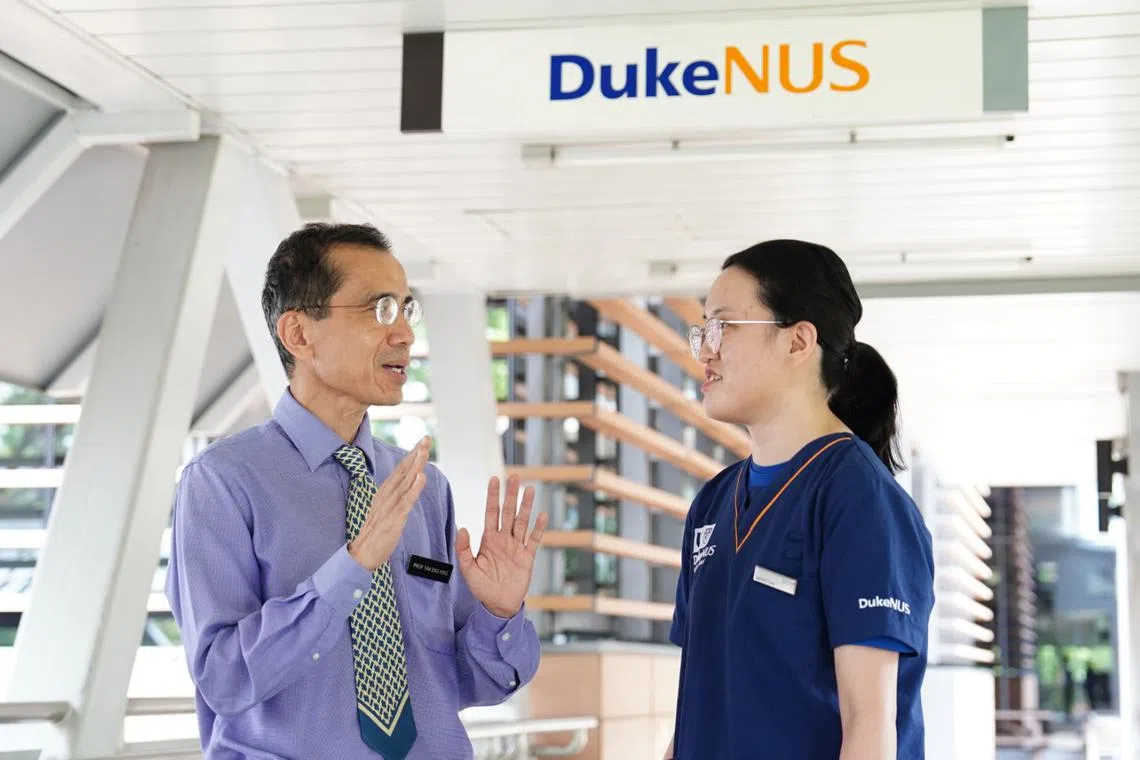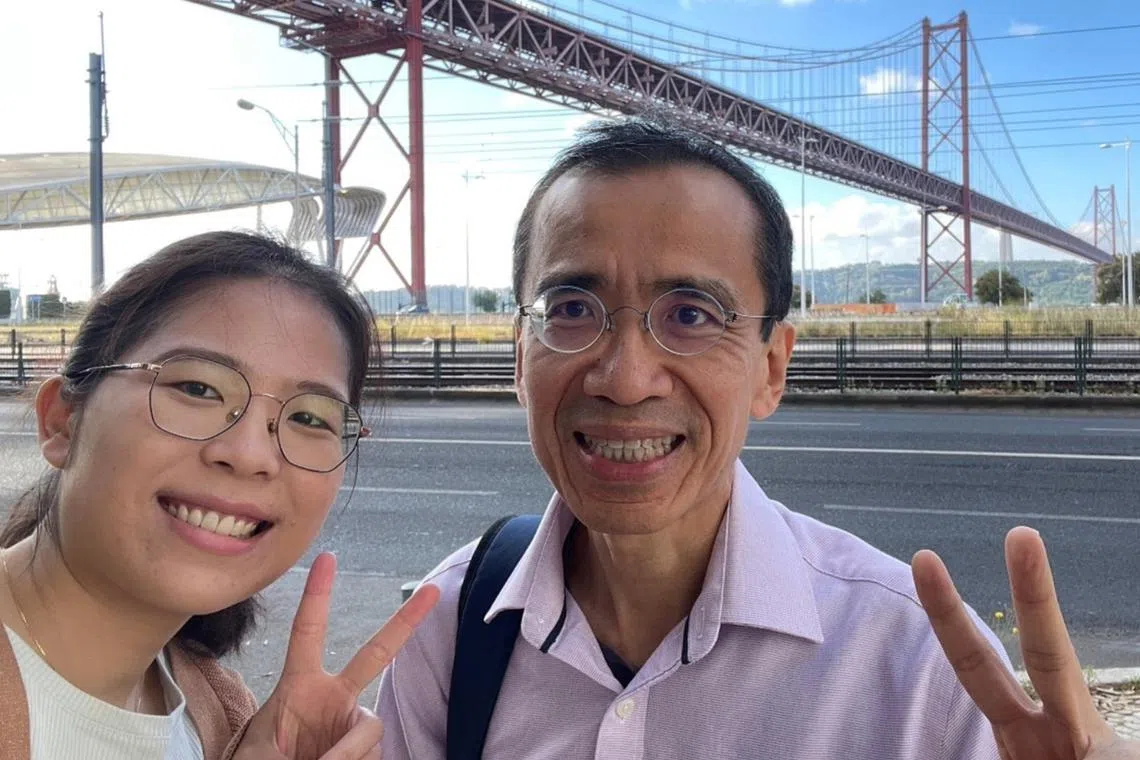BRANDED CONTENT
Medicine, life, balance: How mentors are holistically shaping Singapore’s next-generation of doctors
The mentorship culture at Duke-NUS Medical School empowers students with the knowledge and confidence to thrive from classroom to clinic

Under Prof Tan Eng King’s guidance, Ms Jazreel Low (right) successfully published her research on caffeine dependence and Parkinson's disease in the Journal of Translational Medicine in 2024.
PHOTO: DUKE-NUS
One of the moments that Ms Jazreel Low, a fourth-year student from Duke-NUS’ Doctor of Medicine Programme, will never forget is seeing her name in the Journal of Translational Medicine, one of the world’s leading journals in translational medicine. The feat would not have been possible without her mentor.
He is Professor Tan Eng King, the deputy chief executive officer (Academic Affairs) and senior consultant in Neurology at the National Neuroscience Institute, as well as the academic deputy chair for Academic Affairs with the SingHealth Duke-NUS Neuroscience Academic Clinical Programme. With his extensive experience in clinical studies on Parkinson’s disease, he helped Ms Low fine-tune her research project on caffeine dependence, which sheds light on a hidden health risk affecting one in five caffeine consumers globally.
Prof Tan also connected her with doctoral students from other specialisations, who not only strengthened the quality of her research but also opened up avenues for future collaboration.
More than Prof Tan’s expertise and industry knowledge, his encouragement has kept her motivated in overcoming hurdles in her research.
“Prof Tan never gives up,” she says. “He always says, ‘Just try, just try.’”
Leading the way
For students at Duke-NUS, guidance from supportive mentors like Prof Tan makes a big difference in nurturing their growth as clinician-scientists.
“There is so much to learn, not just about research, but being an academic clinician,” says Prof Scott Compton, Duke-NUS’ senior associate dean for medical education and deputy head of office (Education).
“The mentorship at Duke-NUS far exceeds research training – it helps to develop a student in their journey towards being the professional we want them to be.”
In Year 1, students focus on building foundational medical knowledge, while Year 2 brings clinical rotations across major medical fields. Students embark on their own individual research projects in Year 3.
Such intensive academic rigour calls for a dedicated mentor to provide direction and steady encouragement, says Ms Low. “Whether it’s in terms of research advice or career advice, it’s quite important to have a person who you look up to and will look out for you,” she notes.
Dr Yujuan Yang is another mentee who was inspired by Prof Tan.
“Having mentored many batches of junior doctors and students, Prof Tan understands the struggles and obstacles that medical students and junior doctors have,” says Dr Yang, a Duke-NUS alumni from the Class of 2024, who is now doing her clinical rotations as a house officer at Changi General Hospital.
“He provides good advice on how to manage stress, balance between clinical work and research, and balance between work and life.”

Prof Tan Eng King and Dr Yujuan Yang (left) attended the XXIX World Congress on Parkinson’s Disease and Related Disorders in Lisbon, Portugal, in May 2024.
PHOTO: COURTESY OF YUJUAN YANG
At Duke-NUS, the process of finding a mentor starts from day one at the school, when students are introduced to the research environment at Duke-NUS and SingHealth. They gain exposure to various research facilities and meet established research leaders in Singapore’s medical field. This early interaction helps students understand the breadth of research undertaken at the school to improve patient care and also lays the groundwork for choosing a mentor in their second year.
At the beginning of their second year, students are given a list of eligible mentors to consider, among whom are some of the region’s most highly accomplished clinician-scientists and researchers, according to Prof Compton.
The list also includes information on each faculty member’s specialties, areas of expertise and current mentees.
Ms Low was particularly touched when Prof Tan personally rang her after receiving her email expressing interest in undertaking a research project under his supervision.
“He was travelling when he called me back, but he was very enthusiastic about sharing his research,” she says. “Even though he was in transit, the call lasted 30 minutes.”
But to Prof Tan, this is the least any mentor should do for their mentee. He himself benefited from mentors who generously shared their knowledge and expertise during his studies and early career. “I have been fortunate enough to be mentored by several luminaries in Singapore, USA and Europe and the insights gained from their successes have helped shape my style of mentorship,” he says.
It is important to first understand a mentee’s strengths and weaknesses, and through a period of engagement, to try to ignite their passion and interest in areas where they can best develop their critical thinking abilities, explains Prof Tan. This way the students can forge their own path in research and contribute to improving patient care by addressing the clinical needs they see in their practice as clinicians.
Passing on knowledge and guidance
Just as Prof Tan continues to pay it forward, his mentees are giving back to the school in their own ways.
For Ms Low, this means being actively involved in her peers’ professional and personal development as a college captain at one of the school’s four colleges.
Alongside her fellow captains and college masters, she helps support her peers in their mentorship journeys.
For example, juniors often come to her during the weekly college meetings with questions about which doctors they should reach out to for mentorship.
On her end, as a house officer, Dr Yang helps contribute to teaching sessions for the Duke-NUS and other medical students attached to her team. Being a mentor has helped her reinforce her own foundational medical knowledge. “To be able to explain difficult concepts to others, I need to thoroughly understand these concepts, and only after that, I am able to explain the concepts clearly and in simple words to others.”
Mentorship, she adds, not only helps her build friendships with juniors, but also learn from them. “Everyone has their own strengths, and mentoring is a really unique opportunity not just to get to know someone more deeply, but also learn from them.”
Prof Compton says, “In healthcare, mentorship is vital not only for clinical skill development but also for shaping the ethical, compassionate and leadership qualities that define great clinicians.
“For us at Duke-NUS, mentorship is essential in cultivating what we call the ‘Clinician Plus’ – a clinician who goes beyond medical knowledge to lead, innovate and contribute to advancements in healthcare.”
Learn more about Duke-NUS’ MD programme and other educational programmes on the Duke-NUS website.



